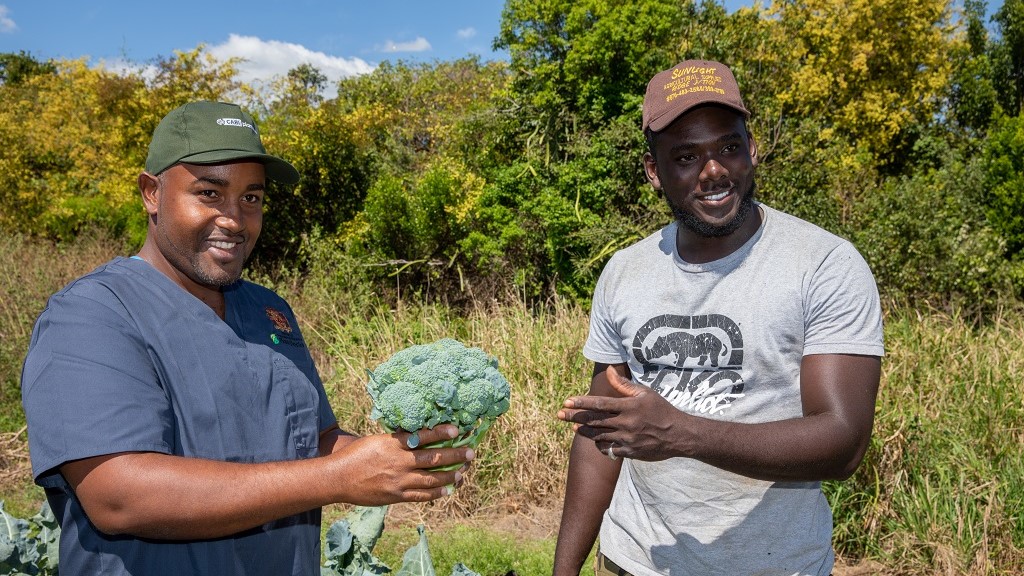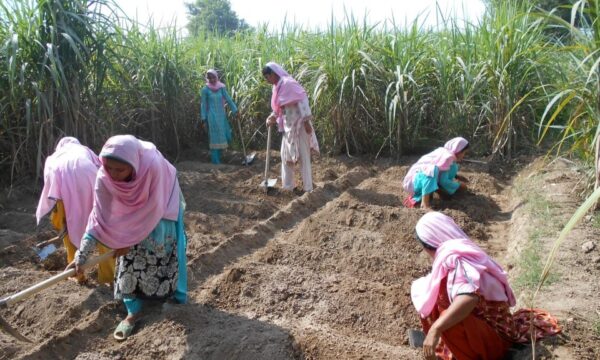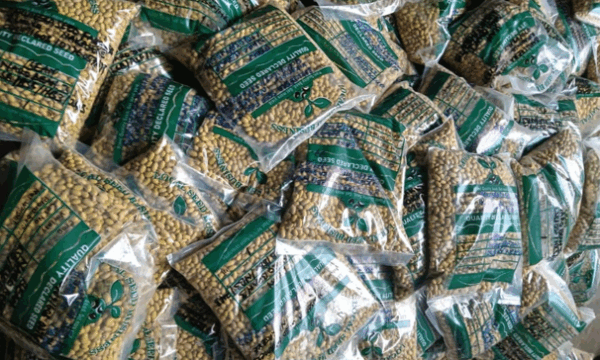
CABI has published a working paper assessing the legacy of Plantwise programmes in six countries: Nepal, Pakistan, Ghana, Kenya, Malawi, and Jamaica. The paper, entitled Plantwise Sustainability: Two Years on, finds that the sustainability of a Plantwise programme hinges heavily on the country in question. This means that while it is difficult to engineer or promote sustainability, a flexible approach that spots and seizes opportunities is vital.
Plantwise and sustainability
The Plantwise programme was implemented by CABI from 2011 to 2020. Its task was to address smallholder farmers’ plant health needs in 34 countries across Africa, Asia and the Americas. In partnership with several other organisations, CABI helped establish networks of local plant clinics, run by trained plant doctors, where farmers received advice on plant health.
Over the course of 10 years, the programme delivered plant health advice to 54 million smallholders, training over 13,200 plant doctors and establishing more than 5,000 plant clinics. Impact studies and evaluations show that plant clinic users adopted recommendations, in full or partially, in 90% of cases. Therefore, using more sustainable practices.
From 2015, CABI paid greater attention to understanding sustainability. That is defined as: “The likelihood that the positive effects of Plantwise will continue, or are likely to continue”. Between 2015 and 2020, CABI made annual assessments. The 2020 assessment predicted: “Plant clinics are very likely to continue to run in most Plantwise countries”.
Two years on, this forecast has proven correct in the cases of Jamaica, Malawi, Nepal, and Pakistan. However, despite promising beginnings, the diverging cases of Ghana and Kenya show how quickly matters can change.
What worked, what didn’t and why?
The assessment notes that a particular set of circumstances can help sustainability in one country while hindering it in another. What’s more, sudden shifts in political environments can undermine achievements and set programmes back. For instance, in Kenya and Nepal, central governments underwent decentralization processes, impacting the agricultural sectors in both countries. Yet while Plantwise in Kenya struggled to adapt to such changes, the programme in Nepal proved remarkably resilient.
A key finding from the assessment is that the national ownership and government engagement levels heavily impacted programme sustainability. When the rollout of Jamaica’s programme began in 2015, multiple authorities and institutes at local and national levels were involved. The country’s initiative was co-financed, meaning greater ownership and support from partners. CABI’s funding was minimal from the outset.

In Malawi, the inclusion of plant clinics in national policy and investment plans ensured continued funding. A key tactic of the Malawian strategy was to develop ‘model villages’. These villages were provided with agricultural technologies and initiatives (including plant clinics). This tactic was included in several policy documents.
However, including plant clinics in policy documents does not always guarantee sustainability. In Ghana, while policies that addressed plant health were created, such as the National Agricultural Investment Plan (2018–2021), no specific budget was allocated for implementation. Despite creating national policies that attended to plant health, Kenya’s clinics declined due to the scarcity of extension staff and funding.
Nevertheless, Pakistan represented an interesting case. Although there was no explicit inclusion of plant clinics in national policy documents, the strong commitment to Plantwise by government partners resulted in the integration of Plantwise activities into the operational budgets of the provincial governments. Likewise, Nepal’s national commitment and investment have largely stayed intact. That’s despite plant clinics being more loosely integrated into national policy compared to other countries.
Helping or hindering sustainability?
Another key finding from the assessment was that the institutional home for a Plantwise programme could either help or hinder sustainability. Which arrangements worked depended on the country in question, as well as timing and momentum. Plant clinics in Jamaica, Malawi, and Pakistan were part of their governments’ existing extension systems, providing the programmes with stable foundations. But in Ghana, the national Plantwise coordination was delegated to the National Plant Protection Organisation, a move which had consequences for plant clinic sustainability due to staffing issues.
CABI’s recent working paper also highlighted the importance of effective data collection and management to support monitoring and decision-making. Despite all Plantwise countries acknowledging the importance of good data management and collection, establishing sustainable practices in most of the 34 programme countries proved challenging. Jamaica was a notable exception, showing an unflinching commitment to keeping its data management system active. Despite its initial problems with data management, Pakistan seems to be heading in the right direction with the creation of its National Data Centre.

The assessment noted that Plantwise’s data management system used a pretty much one-size-fits-all approach. However, user needs, organisational structures, roles, and incentives had been considered as much as possible in developing it. Moving forward, efforts to re-activate data collection in countries where it has not worked well will have to address these shortcomings.
Many of Plantwise’s successful outcomes have depended heavily on the contributions of dedicated individuals. CABI and country partners invested heavily in training plant doctors and master trainers, training over 13,000 plant doctors. However, maintaining support and building capacity has not been possible in all countries. In several countries, plant doctors, as well as data managers, have retired or transferred to other roles. Training national master trainers whilst also integrating course modules into national training institutes appears to be the best way to maintain the numbers needed.
CABI’s continuing role and PlantwisePlus
In 2021, CABI launched PlantwisePlus to emphasize the plant clinic network’s sustainability, complementary extension approaches, and “plus” elements of pesticide risk reduction and pest preparedness.
Further investment into establishing new plant clinics will no longer be the focus of PlantwisePlus considering that with minimal backstopping, national plant clinic networks can become more autonomous. PlantwisePlus is helping this process through refresher training, training of new master trainers, and supporting the revision of teaching materials. Through continuing to develop and enhance digital support tools and expanding the portfolio of e-learning modules, PlantwisePlus will further support countries with relevant knowledge and information that smallholder farmers need to manage evolving plant health threats, increase their incomes, improve food security and safety, and reduce biodiversity loss.
Read the working paper: Plantwise Sustainability: Two Years on Follow-up assessments in six countries
Plantwise 10 year sustainability report published by CABI
Plantwise in review – an award-winning plant health programme
Role of plant clinics in Nepal highlighted at 10th International Plant Protection Symposium
Jamaica’s plant doctors shine in Plantwise programme awards
Plantwise helps reduce extreme poverty in Rwanda
Related News & Blogs
Training Sri Lanka’s agro-dealers in pesticide risk reduction
Agro-dealers provide vital support to Sri Lanka’s farmers. These agricultural input suppliers are often the first point of contact for smallholders who need advice on plant protection products. However, agro-dealers often lack formal training in safer…
3 July 2025




